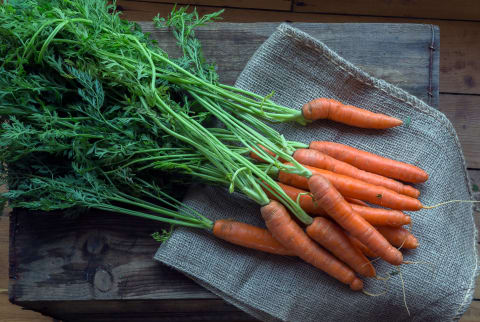Advertisement
Are Carrots Really That Great For Eye Health? An Eye Doc Answers


If you grew up believing carrots would one day bring you superhuman vision, I'm here to tell you: Your parents are liars. That little fib was merely a tactic to get you to eat your veggies, and now that we're all adults, functional eye doctor Rudrani Banik, M.D., wants to set things straight.
What's the deal with carrots and eye health?
The myth originated because it is partially true. "Carrots are rich in beta-carotene, which is converted to vitamin A," she says. Vitamin A is essential for retinal photoreceptor cell functioning1, which helps sense light. Additionally, vitamin A deficiency has been linked to night blindness and dry eye.
So, yes, carrots can benefit eye health, but Banik says there's more to it than that. "We need a range of vitamins, minerals, omega-3s, antioxidants, and bioflavonoids in our diet to maintain good vision," she tells mbg.
Other foods to eat for healthy eyes
In order to eat for healthy eyes, you need a diverse range of whole foods. "We can best get these nutrients through a plant-rich diet by including colorful fruits and veggies, nuts, and seeds," Banik advises.
For other sources of macular carotenoids, add in kale, which is rich in lutein and zeaxanthin, and algae, which is rich in astaxanthin. The antioxidants in dark berries may also help prevent macular degeneration2, so be sure to fit blueberries and blackberries into your daily diet.
If you don't follow a vegetarian or vegan lifestyle, Banik says certain animal-based products, like egg yolks and salmon, are also beneficial thanks to their healthy fats.
Looking for even more suggestions? Here are an R.D.'s favorite foods for eye health.
The takeaway
While carrots can support eye health, eating a diverse, balanced diet may be even more important. So here's an unsolicited tip from a single, childless 24-year-old: Keep lying to your children—just extrapolate on that lie.
Instead of saying carrots will give them superhuman vision, add the nutrients mentioned above.